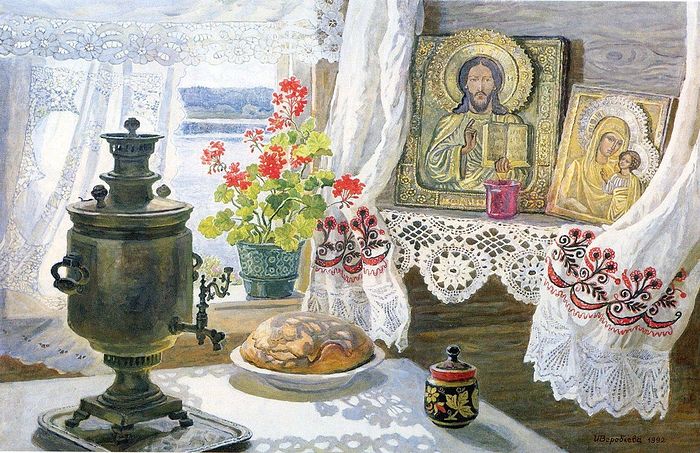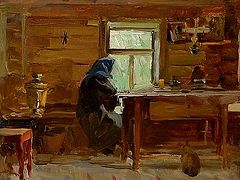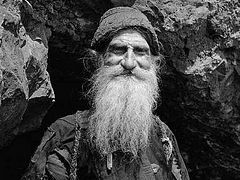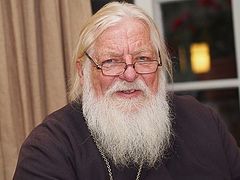 “A Russian Still Life” by Irina Vorobyeva
“A Russian Still Life” by Irina Vorobyeva
He was travelling to his grandma’s—as he had done in his childhood, by train on an upper berth—but now without his parents and in very low spirits. Earlier at the mention alone of grandma he would be happy for a whole week, counting the days and hours before seeing her; and now he was lying, face to the wall, staring fixedly in front of himself, carried away with agonizing thoughts: If grandma doesn’t help him it will be the end of him. When he carelessly took out a high-interest loan to open what he believed to be a successful business, his life went topsy-turvy. First his partners deceived him—they took his money and left him responsible for everything; then his friends broke with him and eventually his wife deserted him, tired of his never-ending problems. When all the attempts at repaying the bank had been exhausted, he almost gave up but then suddenly remembered granny, who lived in a faraway Ural village. She loved her grandson above everyone else; and though she was poor (she didn’t even have a refrigerator and stored her food in an ice-box in the cellar), she owned some old icons that would cost a lot of money in the market. Earlier he wouldn’t have made up his mind to sell his granny’s beloved icons, but since he had an overwhelming loan that kept growing like a snowball, threatening to crush the remainder of what had been his very quiet life not long before, he simply had no alternative.
As far back as he could remember, grandma kept her icons in the most conspicuous place—in the holy corner of her house, where people usually put their TV. She would go to church on Sundays and Church festivals, and begin and finish every day with prayer. She would work in the kitchen garden, then milk her goat Manya, give her grandson warm milk with strawberries to drink, put on her red headscarf, light an icon lamp in front of her icons and say: “What a wonderful day the Lord has sent us! Let us give thanks to Him, my grandson!” While grandma was praying, he would be sitting on the bed, no longer thinking of his toys, gazing enchanted at the icon lamp twinkling like a semi-precious red stone, until he fell asleep happy.
When after the sixth grade he spent the whole summer at granny’s, she took him to church, had him baptized, and taught him to pray “Our Father” and “O Theotokos and Virgin, Rejoice”, and then gave him back to his parents with a light heart. Seeing a cross on her son’s chest, her daughter-in-law rebuked her: “The boy should first grow up and decide for himself which faith to choose! Don’t meddle in the lives of others!” Grandma sighed with remorse as she listened; and then she said simple-heartedly that in the city you can get lost before you’ve figured out what faith to choose, and she couldn’t allow this to happen. She loved her grandson more than her own life and used to say that he took after his granddad—he was as resolute and stubborn as her reposed husband. Grandpa was a miner and died young, and after his death, grandma lived the rest of her life alone and never left her village. And there was no need to leave it—the village provided her with all she needed. Her potato harvests were so abundant that she always had sufficient for herself and to share with all the neighbors; her goat Manya gave her milk every day; and her chickens laid eggs. And she didn’t want to leave her late husband buried by the church she loved so dearly. She would cut hay, dig up potatoes and look after the house herself.
She prayed to Christ to give her good health in her old age so that she might not be a burden to anybody and might die peacefully in her village; and she was never sick. She lived in the remotest depths of the Russian backwoods in an excellent environment, with the taiga [the swampy coniferous forest of high northern latitudes, especially in Russia’s Siberia.—Trans.] and a river close by, and with the last local factory closing as far back as the 1990s. The authorities even planned to show the beauty of local nature to foreigners.
Seeing her beloved grandson on her doorstep, granny shed a few tears of joy, stroke his hair for a long time (as she never tired of looking at him) and then ran to the shop to buy some Polish sausage, chocolates and his favorite ice-cream. He had not visited her since school, and now it astounded him to find her house so small and old, though it had once seemed huge to him. It had only one, spacious room with a Russian stove and plank bed,1 where as a boy he used to sleep; a tall-backed iron bedstead with pillows under cotton print curtains, a round table with an oilcloth on it, and a sofa by the window. There were old pictures in frames, along with a reproduction of the painting, “The Morning in a Pine Wood”, by Ivan Shishkin, on the wall. The icons were in their place—in the holy corner. At the first sight it was clear that all the icons were antique and absolutely intact. No wonder, since grandma “fussed over” them and cherished them as her most precious treasure. He remembered how granny used to tell him that they had inherited them from his great-grandfather. He fought in the First World War and returned home lame, but with a St. George’s Cross he had been awarded for bravery. The villagers esteemed him and elected him as their church warden. When the Bolsheviks came to power and some Komsomol members came from town to close all the churches in the area, he drove them away, took out the icons from the church, hiding some and giving the others to his wife, telling her to guard them like the apple of her eye. After that he left and never returned. Afterwards it was said that he became “an enemy of the Soviet Government” and was executed by firing squad.
At first the icons were kept in the attic; and when everything quieted down, grandma placed them in their proper place—in the holy corner. Granny prayed in front of them her entire life. Grandma’s icons always stood in their glass frames, adorned with covers sewn with colored pearls. As he was looking at the darkened images with their penetrating eyes, he made the sign of the cross as if involuntarily, feeling a vague excitement.
Grandma certainly had something to celebrate in that evening! She baked milk mushroom and cloudberry pies and brought the raspberry liquor out of her cellar. She seated her grandson under the icons, poured some liquor into two shot glasses for both of them, and announced solemnly:
“My darling, my own flesh and blood, you are my only grandson and all my life I have prayed for you to God so that you would become a good person! And indeed you have become so handsome, so intelligent, and you graduated from an institute… Your father wrote that you had opened your own, big company! If your late grandad could see you now, his joy would have been boundless!”
He was taken aback by these words. And grandma proceeded with a smile:
“I have started growing weak recently, I feel dizzy most of the time… I easily get tired after working just a little. I am advanced in years, and the Lord may take me any day now… I prayed to God that He would send you to your grandma, and now you are here! I have no fortune to bequeath to you, very little money, and my house is decrepit… The only thing I am going to bequeath to you, my dear, is your great-grandfather’s icons!”
And she told her dumbstruck grandson about each icon in length:
“This is St. Nicholas the Wonderworker. He will be the first to help you in any work; with his support the success of any undertaking will be assured! Here is St. Simeon, kind and hospitable… He would go from house to house, telling people about God and sow sheepskin jackets. Pray to him, and peace and love will reign in your home. When you decide to marry, be sure to take your chosen one to him in Verkhotourye—and he will bless your marriage. Your grandad and I went to his village of Merkushino2 for our church wedding and we were heart and soul with one another our whole life. Whenever you don’t know what to do, pray to Greatmartyr Catherine—she will illumine you and guide you on the right path! Bear the Cross of Christ in your heart continuously and pray to it—it has been given us to protect us from enemies and misfortunes! And never take off the cross I put on you when you were baptized—keep in mind that whoever is without a cross is not Christ’s! And this is my favorite: an icon of the Holy Theotokos! It will protect you throughout your life! There is no greater Intercessor and Helper of ours on earth than the Mother of God!”
He travelled back on the same old train and was alone in his carriage. He took his grandma’s icons out his bag, placed them on the seat in front of him and looked at them silently for a long time. He tried to hold on as long as he could, but unable to keep the lid on it burst into tears. He fell on his knees before the icons and, tears spreading all over his face, kept whispering: “Forgive me!” He kept praying the prayers that he had forgotten since childhood and couldn’t stop praying.
As soon as he got back home, he hurried to his garage. He still had no idea how he would solve his numerous problems and sort out the situation, but what he did know is that he would start with a shelf for his grandma’s icons.



